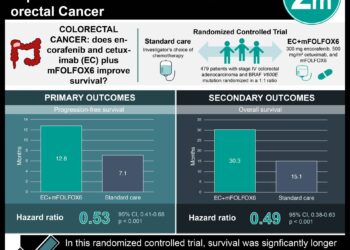Active monitoring compared to maintenance capecitabine is a viable alternative for stable metastatic colorectal cancer
1. Progression-free survival was extended by the use capecitabine as compared to active monitoring, but at the expense of increased toxicity. There was no difference in overall survival between treatment arms.
2. Quality of life scores were similar between the two treatment arms.
Evidence Rating Level: 1 (Excellent)
Study Rundown: Current standards of care for the palliative treatment of metastatic colorectal cancer (mCRC) include continuing therapy until excess toxicity or progression of the disease occurs. Previous studies have shown that treatment breaks can decrease the burden of toxicity while improving quality of life (QoL). This study compared the progression-free survival (PFS) of two treatment arms: one receiving maintenance therapy with capecitabine (a pro-drug that is activated by tumour cells) and the other receiving active monitoring (AM). Secondary outcomes included overall survival (OS), QoL, toxicity, and safety. Capecitabine improved median PFS as compared to AM, while overall survival did not differ significantly. Quality of life was assessed via EQ-5D forms and there were no significant differences in QoL scores. However, discomfort and pain were somewhat increased in the AM group as compared to the treatment group, potentially due to the increased rate of progression. Toxicity was less in the AM arm. Toxicities manifested as nausea, diarrhea, fatigue, palmar-plantar erythema, and skin rash. A limitation of this study was that it was underpowered to accurately evaluate OS, though it showed similar values when adjustments were made for minimization factors. Additionally, because the study excluded patients with baseline thrombocytosis (a worse prognosis group) between January 2014 and June 2017, the study under-represented about 25% of patients with mCRC. Furthermore, this was a subset of a multi-platform study that excluded patients with actionable mutations which was a source of significant bias. In general, providing treatment breaks can be suitable for stable patients with mCRC.
Click to read the study in JCO
Click to read an accompanying editorial in JCO
Relevant Reading: The Role of Maintenance Strategies in Metastatic Colorectal Cancer: A Systematic Review and Network Meta-analysis of Randomized Clinical Trials
In-Depth [randomized controlled trial]: This study conducted in the United Kingdom compared outcomes of progression-free survival (PFS), overall survival (OS), toxicity, and safety in either maintenance therapy with capecitabine or active monitoring in a randomized trial of 254 adult patients with metastatic colorectal cancer (mCRC). Eligibility criteria for this study (FOCUS4-N) included adult patients with mCRC who were stable at the 16-week CT scan and who did not have targetable mutations. As a result, this trial is potentially biased towards outcomes observed in patients without these mutations. During the first 3.5 years of the study, patients with baseline thrombocytosis were excluded based on existing literature showing they had a worse prognosis. Further analysis discredited these findings and the last 2.5 years of the study included this patient group. A total of 254 patients were randomized, with 127 to each of the study arms (capecitabine versus active monitoring). Capecitabine was dosed orally twice a day for 2 weeks, followed by a one-week rest period (standard dosing guidelines). Patients in this treatment arm were requested to take capecitabine until disease progression, intolerable toxicity, or death. PFS was increased in the treatment arm (hazard ratio (HR) = 0.40; 95% confidence interval (CI), 0.21 to 0.75; p < 0.0001), but no significant improvement in OS was seen (HR = 0.93; 95% CI, 0.69 to 1.27; p = 0.66). Toxicity was greater in the treatment arm, while QoL was similar between study arms. Assessment of QoL included measures such as usual activities, self-care, anxiety/depression, or mobility. Pain/discomfort was somewhat less in the treatment arm though not statistically significant (p = 0.11) and the authors postulated this may be because of the progression rates in the active monitoring study arm.
Image: PD
©2021 2 Minute Medicine, Inc. All rights reserved. No works may be reproduced without expressed written consent from 2 Minute Medicine, Inc. Inquire about licensing here. No article should be construed as medical advice and is not intended as such by the authors or by 2 Minute Medicine, Inc.



![2 Minute Medicine: Pharma Roundup: Price Hikes, Breakthrough Approvals, Legal Showdowns, Biotech Expansion, and Europe’s Pricing Debate [May 12nd, 2025]](https://www.2minutemedicine.com/wp-content/uploads/2025/05/ChatGPT-Image-May-12-2025-at-10_22_23-AM-350x250.png)



